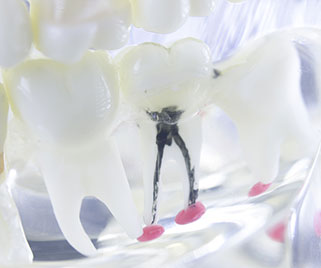Root Canal Treatment Melbourne
Restore and Maintain Your Tooth
A tooth that has undergone root canal treatment is no longer alive. The treated tooth can remain in the mouth as long as the inside of the tooth (the root canal) is cleaned, sterile, and sealed. Molars generally have multiple canals, whilst incisors can have just one canal. Treated teeth often need to be reinforced with a crown to prevent fracture following treatment.

Diagnosing Root Canal Treatment
Your Carnegie Dental Group dentist may recommend that your tooth undergo root canal or endodontic treatment to save a damaged or decayed tooth.
It is better to save the tooth rather than extract it because your tooth will function better than any artificial replacement. Your natural tooth is usually stronger and more efficient for biting and chewing. Cleaning and maintenance is also much easier and therefore less likely to have a negative impact on the remaining dentition.
If your tooth were to be extracted and not replaced, problems with biting, chewing and general oral health may arise in the future. For example neighbouring teeth can drift into the extraction space created, leading to a change in the alignment of all teeth. This may in turn cause biting to become less efficient as forces are not transmitted optimally through the teeth.
Root canal therapy is required because bacteria have entered the root canal through a defect in the outer protective layers of enamel and cementum—such as dental caries, leaking restoration margins, cracks or fractures. The bacteria irritate the pulp (nerve and blood vessels of the tooth) causing it to become inflamed and later die. An infection then develops within the tooth, spreading via the tip of the root to cause a reaction in the surrounding bone. This reaction may be chronic (slow) or acute (sudden) in nature depending on your immune systems’ ability to balance the situation. Symptoms may arise such as pain (ache, throb), sensitivity to cold or heat, tooth discolouration and swelling and tenderness in the surrounding gum and bone.
Root Canal Therapy Procedure
The process of endodontic treatment is divided into two stages: cleaning and shaping the root canals and subsequently filling them up.
The first stage may be completed in one appointment or may require multiple visits depending on the complexity of the root canal system. Anti-bacterial medication may be placed in the root canals between visits to help stop the infection. Oral antibiotics may also be prescribed if a severe abscess has formed at the root tip. Pain or discomfort following treatment is rare, but if present may be treated with mild painkillers such as paracetamol or aspirin. If pain persists for more than a few days please feel free to contact Carnegie Dental Group.
The second stage of treatment involves filling the root canals and sealing off the pulp chamber to prevent further infection. A post may be inserted into a canal to support an artificial crown. An endodontically treated tooth is usually at increased risk of fracture and thus may require the increased protection, strength and further seal of a dental crown.
At the completion of root canal therapy, the tooth is no longer alive however it remains functional as part of your dentition. The tooth must be looked after the same way all other teeth are maintained.
Success of Treatment
Your tooth will only be treated if there is a good chance it will last a long time.
However, no guarantee can be given – because people have varied healing responses and some infections may respond differently. Studies have shown the majority of endodontic treatments are successful and uneventful. If your case is considered less favourable, then you will be informed.
Healing of the jaw bone around the tooth can be slow and it is important to have your tooth reviewed regularly to assess healing. You will be recalled for these checks.
Rarely, additional treatment in the form of an endodontic surgical procedure may be required to aid the healing of the tissues around the tooth. Your dentist or endodontist will discuss this procedure with you if it becomes necessary.

Root Canal Treatment in Melbourne
The CDG is now open late nights! We are opened until 7pm on Tuesdays & Wednesdays.
Schedule an Appointment - Saving your tooth is often the best choice
Fill out the form below and we will contact you during our working hours. If you have a dental emergency, please call (03) 9571 9016. Urgent care is provided usually on the same day.
 (03) 9571 9016
(03) 9571 9016 Find Us
Find Us